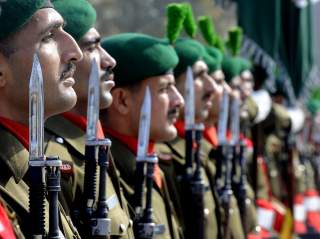Operation Karachi: Pakistan's Military Retakes the City
"If the roots of Karachi’s woes are political, so are the keys to its success."
According to data from Karachi’s Citizens Police Liaison Committee, during the first six months of 2015, murders are down by 60 percent compared to the same time period last year. Bank robberies, extortion attempts, and kidnappings—all key ways to fund militarized political parties and terrorist organizations—have dropped between 70 and 83 percent.
While officials from the MQM claim that the army is singling out their party—and this is indeed a perception held by many Muhajirs—the truth is that the operations have been wide, if not comprehensive, in their scope.
Al Qaeda and TTP networks have been relentlessly targeted by the paramilitary Rangers, police, and Inter-Services Intelligence (ISI) officers—often in the city’s Pashtun enclaves, away from the view of Muhajirs.
In April, the Karachi chief of Al Qaeda’s South Asia affiliate (AQIS) was killed along with four of his colleagues in a raid by the Karachi police’s special counterterrorism unit. This and other raids have been mentioned in several angry statements from local jihadists. In one instance, an Urdu-language Islamic State propagandist described this summer’s heat wave deaths in Karachi as Divine Retribution for the killings of these jihadists.
Al Qaeda militants have also been arrested in more central areas of the city. This month, two alleged AQIS militants were killed in the city’s Gulshan-e Iqbal area. An ISI officer was slain in the operation.
But more than body bags, it is the sentiments and perceptions of the local population that are more reliable indicators of the success of the Karachi Operation. The state of fear is far less severe. Karachiites are more willing to go out to eat at night than ever in recent years. And residents of the city’s predominantly Pashtun areas say they are now largely free from the TTP extortion networks that have been haunting them.
Restoring a Broken System
If the roots of Karachi’s woes are political, so are the keys to its success, according to the Pakistan Army’s Mukhtar. A sustainable peace in Karachi, he said, requires “political reform, capacity building of law enforcement agencies, and good governance.”
If Mukhtar sounds very much like the commander of a counterinsurgency campaign, it is because the challenge in Karachi is very much an urban insurgency. And Mukhtar knows one when he sees one. He previously commanded a brigade in South Waziristan and also led the ISI’s counterterrorism wing.
An elected, legitimate, and empowered municipal government is an essential part of the political resolution to Karachi’s systemic challenges. The Sindh provincial government led by the PPP has pushed for yet another delay in municipal polls. Without a government of its own, the city of Karachi remains a political orphan—a megacity ultimately run by a feckless octogenarian provincial chief minister. Local government elections would also provide incentive for the MQM’s non-militant leaders to step up and pull the party away from violence; free and fair elections would also give other parties, such as ex-cricketer Khan’s PTI, a chance to give Karachiites an alternative to city’s predatory parties.
For Karachi to move forward, Pakistan’s law enforcement agencies and security services will also have to look within. The paramilitary Rangers have been accused of unlawfully seizing public land. Police officers have been linked to organized crime. Extrajudicial killings, euphemistically referred to as as “encounters,” remain a common police tactic in Karachi (and, in fact, elsewhere in Pakistan, India, and South Asia).
Karachi is no easy terrain to operate in. Hundreds of Karachi’s police officers have been killed in the line of duty in recent years. Many of them have been individually targeted by the MQM, out of retribution for previous operations.
But for their hard-won gains in Karachi to be sustained, the city’s security forces need to conform to the standards they hold other power brokers to; and they must soon hand over the reins to a legitimate, elected municipal government.
Arif Rafiq is president of Vizier Consulting, LLC, which provides strategic guidance on Middle East and South Asian political and security issues. He tweets at @arifcrafiq.

